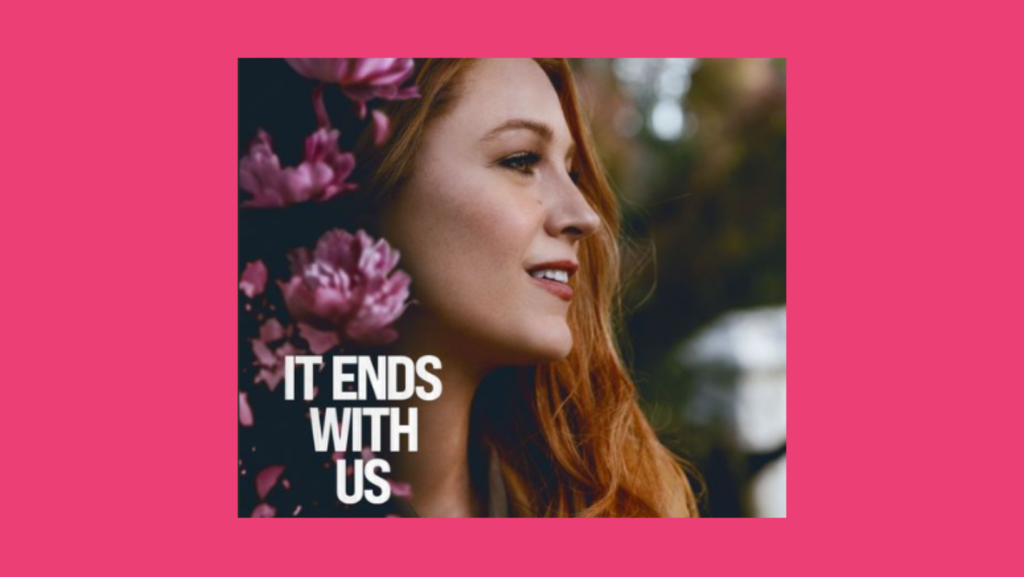
By Danielle Georgiou – Domestic Abuse Partnership Specialist at Oasis
Recently I took myself for my first ever solo cinema trip, so I thought what better film than the one that is raising awareness and conversations around Domestic Abuse, It Ends with Us.
Trying my hardest to keep an open mind, being fully aware I will be viewing this from a domestic abuse and trauma lens, both from a personal and professional perspective, I settled myself in the shadows of the cinema to watch this much mixed reviewed screening.
As a film in its own right, the acting isn’t too strained, a little formulaic in places, the dialogue is overall acceptable and the cinematography is pleasant with soft angle approaches and atmospheric lighting shots. It’s a watchable film that handled some aspects quite sensitively (in my personal opinion, perhaps too sensitively at times), so as not to be too triggering for a wider audience. However, there are some triggering moments in the film for people who may have been subjected or experience trauma and abuse.
The overall storyline is not too difficult to follow with minimal overarching themes. I have found it really interesting, that many conversations I have had since seeing the film with people is that they felt slightly surprised by the actual concept of the film, as they thought they were going to see a light hearted mushy rom-com. These interactions have been mainly a male reaction to the film. I am not sure if this is due to people not following advertising, bad advertising or just generally being ignorant to the surrounding societal messages when domestic abuse is presented.
The film focuses on Lily, a white, wealthy and advantaged woman who has visions to follow her own path and career as a self employed florist. Escaping her generational trauma, from an abusive father, a well-respected member of society we see how Lily disconnects from her hometown. She returns due to the death of her father and to support her grieving mother. The film encapsulates well that even in times of an abuser’s death, we do not have to be forgiving and forgetting to our abusers because it makes other people feel comfortable. People will minimise and gaslight an abusers behaviour, to fit the narrative they want of that person. It also highlighted how despite being subjected to horrendous abuse for decades the mother still loved her abuser and was deeply affected by his passing, which can often be overlooked in real life: how conflicting this can be for survivors, the relief and sadness felt at the same time.
Lily then meets Ryle, a confident white man, respected neuro surgeon, in a position of power oozing with confidence and charm. He is extremely assertive. During this scene when they first meet, Ryle is throwing his body weight around and kicking over furniture in a moment of angry despair, seemingly unaware Lily is present. I wonder how many people watching this saw it for the red flags it presented or sympathised with him straight away, when he explained his reasoning behind his behavior. Lily seems undeterred by this and almost apologetic for being in his presence. Already a baseline of how subtle coercive manipulation during the grooming stages in abusive relationships begin. In true film style, fate intervenes and Lily becomes best friends with Ryle’s sister, reigniting their encounters. They find each other a challenge, with Lily originally not being open to a relationship with Ryle-yet he persists, oversteps her boundaries and eventually Lily lets her guard down enough to embrace the relationship of commitment and love she hopes for. The sister dynamic was an interesting approach of a bystander of abuse, a fortunate one for Lily it would seem, and whilst it was refreshing to see a supportive character linked so deeply to both Lily and Ryle, I am concerned that this gives a misconception of how rare her acceptance to Lily trying to leave her abusive brother is in real life for victims. More often than not, victims experience isolation from any potential support networks.
The film does highlight how victims of abuse can be anyone, even those from privileged backgrounds, who seemingly are successful in their own right. It also highlights how falling in love, especially when that love has developed from trauma bonding, can be hidden in plain sight and not be as obvious as people expect it to be, including for the victim. There were multiple explanations to the physical abuse inflicted on Lily, leaving her confused, in states of shock, showing at times fawning behaviors, defensiveness of others’ questions, which was deliberately and cleverly written for the viewer to also feel conflicted about what was actually happening until it becomes more apparent nearer the end of the film. It clouds your judgement frequently due to the intense emotions they feel for each other and the often affectionate, respectful relationship they share.
Another character is Atlas. Lily’s first love as a teenager, he is the first person to make her feel safe with reciprocal admiration and respect for each other. He was a victim of abuse himself and again their trauma bonding stayed with them throughout their lives. During a not so chance encounter as adults, they are reunited in a public setting, causing awkwardness, especially as Lily has a visible but obviously covered up black eye. Atlas’s response is one of visceral anger and protection for Lily and he is framed as the good guy…however one of his main interactions with her is trapping her in a bathroom, invading her personal space, demanding her to tell him her intimate business, insulting her choice of relationship by comparing her to her mother, and hitting the door frame. Another encounter they have is him physically fighting Ryle in public, putting Lily at greater risk from her abuser when he begins to understand the historic connection they share. Cue intensified jealousy, stalking, sexual abuse and victim blaming from Ryle towards Lily, leaving Lily feeling guilty and even more receptive to Ryle’s demands on who she can and can’t interact with.
Lily then trapped between her emotions for her first love and love for her current husband is left scared and vulnerable. She eventually with a support network, is able to leave Ryle. Atlas redeems himself by at least taking accountability for his actions and being a respectful friend, also helping her to keep safe. Lily then finds out she is pregnant by Ryle. For Lily this was the beginning of the end of her decision to leave Ryle for good. But I feel like here especially is where the film could have highlighted the barriers and challenges, and safety implications of what pregnancy and children bring to someone who is experiencing abuse. Pregnancy can be a starting point for intensified abuse and this increased risk continues until the child is about 18 months. Pregnant women are far more likely to protect their unborn or newborn child when being assaulted than themselves, which can result in further injury, but during the film this moment was presented as a catalyst of protection for Lily.
It was tied up in a neat package of empowerment for her, gaining back control in a short space of time, establishing the end of the generational trauma and eventually reconnecting with her perceived true love of her life. Happy endings all round, …But this is not often the reality for survivors and victims at all, and the film was weak in portraying this, which could have given a much wider audience the concept to see the different perspectives of post separation abuse.
Overall, this film has raised awareness and conversations around some complexities of abuse. It has tried to have a balance of delicate, intimate moments for the viewer as well as some more hard hitting realisations. It is worth a watch and I applaud the attempt to engage audiences and media in conversations around abuse, but I feel many victims may not be able to resonate with the victim/perpetrator dynamic the film promotes domestic abuse as, maybe even feeling like they have not been able to follow Lily’s example and harbor self-blame. In reality, the experience of abuse is much more complex, gritty, lonely, heavily judged and misunderstood. The overall message that should be taken away from the film and in real life, is abuse is never ever the victim’s fault and always that of the abuser, regardless of personal trauma, background, job title, ethnicity, age and financial status.
If you or someone you know is experiencing domestic abuse, please give us a call on 0800 917 9948. If you’re not sure, click here to find out more about healthy and abusive relationships.

